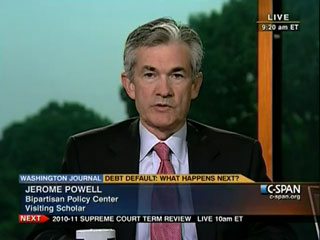Debt Crisis: Jay Powell Answers Questions on Bipartisan Policy Center Report Regarding
Default on Debt
July 6, 2011
Diane W. Collins
dcollins@marketingweb.com
UPDATED: 7-10-11
 |
Jay Powell Answers Questions on Default Bipartisan Policy Center |
Jay (Jerome) Powell, visiting scholar at the Bipartisan Policy Center in Washington, DC and main author of the June 28th report, Debt Limit Analysis answered questions during the Washington Journal on CSPAN this morning. We mentioned the Bipartisan Policy Center report in our July 1st Weekly Wrap, Treasury Secretary Geithner & Raising the Debt Ceiling: "The Boy Who Cried Wolf?"
Points made during the Washington Journal interview that we found noteworthy are as follows. When asked if the United States would default on the debt Powell supported the view that sovereign debt is paying interest and returning principle on Treasury debt instruments. (This is not what Geithner has been telling Congress and the nation.) Powell went on to state that should we pass the August 2nd so called [X-Date] Treasury would not be able to meet other obligations, as I made clear in our Weekly Wrap on July 1st. Powell estimates that the cash inflows to the Treasury during the month of August (from the 3rd through the 31st) will be $172.4B while payables total $306.7B.
Looking at Powell's charts for August 2011, the interest payment due on Treasuries securities is $29B (sovereign debt service), Social Security and Medicare payments total $99.2B. That leaves $44.2B from cash inflows to prioritize for the left over $178.5B in August payables. One fix that could be applied on a short term basis was used in 1996. Congress passed a debt limit exemption at that time allowing the Treasury to make the Social Security payments due. That would free another $49.2B raising the amount available for prioritization to $93.4B leaving $85.1B in payables unmet. This would be fine if Treasury had all the money up front. The problem comes with understanding the daily cash flow analysis. Check the inflows for August 3rd, the day after the [X-Date]***
Although the United States would avoid default and continue to meet Social Security payments by these measures, Powell states many other areas of government would not continue to receive payment and the Federal government would be forced to "pick and choose." But even Powell recognizes that this would "not bring the nation to its knees," if implemented for a short period of time... Past the month of August, however, it could begin to produce greater risk.
Additionally, Powell mentioned the $500B in Treasury debt that matures in August. As, stated in our Weekly Report of July 1st investors generally roll (re-invest) their principle into new debt issues. However, if investors feel the risk of interest and principle has increased Treasury will have to pay a higher rate of interest in order to attract re-investment. If investors feel the risk of repayment is too great they will not re-invest and Treasury would need to come up with the $500B to return principle. Our view is that Geithner's "false and misleading statements" regarding the potential of default while opposing Republican legislation to ensure debt obligation payment (H.R. 421 and S.163) were politically cast in order to protect the big government spending policies of the Obama Administration. In our opinion, increased risk to foreign and domestic investment in Treasury securities is possible but unlikely as long as we continue to meet our sovereign debt obligations and develop a plan that cuts spending, caps the debt ceiling, and implements a balanced budget amendment.
Today the Senate began the long overdue discussion regarding the debt crisis and finding a solution to how we approach the debt ceiling. President Obama will meet with Congressional leaders both Democrat and Republican on Thursday to discuss how to move forward. The American people are watching. No more games, no more rhetoric.
**Some confusion was caused over the figures we quoted from Mr. Powell's Daily Analysis of cash flows for August 2011. Quoting from his chart for August 3rd (the day following the [X-Date] we stated that Treasury cash inflows were $12B for August 3rd and Social Security payments due on August 3rd were $23B. These figures can be found on page 16 of the Bipartisan Policy Center's 6-28 report Debt Limit Analysis. According to these figures Congress would need to implement a debt limit exemption for Social Security payments similar to what it did in 1996.
Contact: Representatives, Contact: Senators